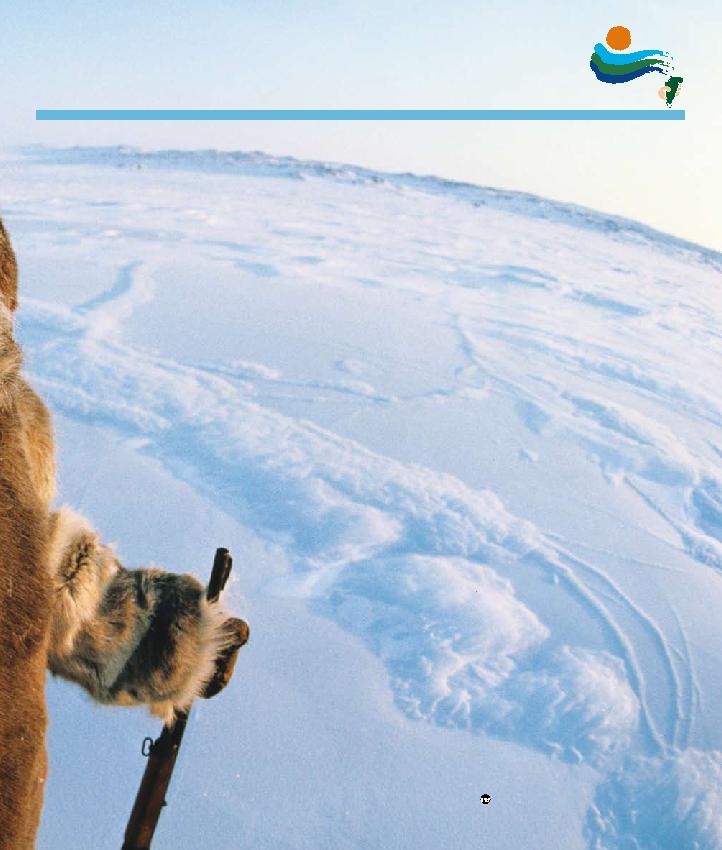
ensured that it included traditional knowledge, that it would be more than a
piece of science, and that policy recommendations should be attached to it.
Among its key conclusions were:
Marine species dependent on sea ice, including polar bears, ice-living
seals, walrus, and some marine birds are very likely to decline, with
some facing extinction.
For Inuit, warming is likely to disrupt or even destroy their hunting and
food-sharing culture as reduced sea ice causes populations to decline or
become extinct.
More recently the Intergovernmental Panel on Climate Change,
involving over 2,000 scientists, came to much the same conclusion.
This is a good sign: the world now finally appears to be singing from
the same song sheet.
Climate change in the Arctic is not just an environmental issue
with unwelcome economic consequences. It is a matter of
livelihood, a matter of food and a matter of individual and cultural
survival. It is a human issue affecting our children, our families,
our communities. The Arctic is not `wilderness' or a `frontier'. It is
our home and homeland.
Despite the ACIA's compelling science we continued to have
challenges with the global community over this urgent
issue. At the time, as Chair of ICC, I looked at international
human rights regimes in
place to protect peoples
from cultural extinction
-- just what we Inuit
could be facing with
climate change. The
question before us
was how to bring
some clarity of
purpose and focus
to a debate that
always seems to be
caught up only in
technical arguments and
competing short term
economic ideologies. I believed
strongly, and still do, that
it would be internationally
significant if global climate
change were debated and examined
in the arena of human rights -- one that
many governments, particularly in the
developed world, take seriously.
I.
II.
After two years of preparations, I and 62 other Inuit from Canada and Alaska
filed a legal complaint last December. We believe that the 1948 American
Declaration on the Rights and Duties of Man, supported by the Inter
American Commission on Human Rights, may provide an effective
means for us to defend our culture and way of life. We are not asking
the United States and the world to take a backward economic step.
What we are saying is that governments must develop their economies using
appropriate technologies that significantly limit greenhouse gas emissions.
Inuit and other northerners are at peril because some are taking a short-term
view favored by some businesses.
My purpose is to educate and encourage the global community to join to
combat global threats. Through our work, we have put the human face front
and central. We have changed the international discourse from dry technical
discussions to debates about human values and human rights, and have given
United Nations conferences a heartbeat, a renewed sense of urgency. We did
this by reminding people far away that the Inuit hunters falling through the
thinning ice are connected to the cars they drive, the industries they support
and the policies they chose to make and enforce.
Our work has not been aggressive or confrontational. We are reaching out,
not striking out. The Inuit message is a `gift', an act of generosity from an
ancient culture, still deeply tied to the natural environment, to an urban,
industrial and modern world that has largely lost its connection with it.
Initially the Commission chose not to "proceed at present" with our petition. When
we insisted, it decided to hold a hearing on the legal aspects of climate change
and human rights. This was truly a historical moment for us and the world.
We Inuit have lived in the Arctic for millennia. Our culture and economy
reflect the land and all that it gives. We are connected to the land and our
understanding of who we are -- our age old knowledge and wisdom --
comes from it. Our struggle to thrive in the harshest environment has given
us the outlook we need to survive in the modern world. That outlook -- a
respectful human one that sees connections to everything -- should inform
the debate on climate change. Is it not because people worldwide have lost
the connection between themselves and their neighbours, between their
actions and the environment, that we find ourselves having to come to grips
with climate change?
We will adapt as best we can. But I strongly believe, as do many others well
versed in this issue, that there is a window of opportunity in the next 10 to
15 years to make effective changes in how we live as the global community.
There is still time to prevent from fully unfolding ACIA's stark predictions that
our hunting culture will be lost in my grandson's lifetime.
We must come together as a global community and understand our shared
humanity -- so as to take responsibility and immediate action to address this
defining issue of our time.
OUR PLANET MAGAZINE
CLIMATE CHANGE AND THE CRYOSPHERE
5
© James B
alo
g/S
t
one/G
ett
y Images
Sheila Watt-Cloutier, environmental campaigner and International Chair of the Inuit Circumpolar Conference 20022006, was named by UNEP as a
2005 UNEP Champion of the Earth. The award is given annually to seven outstanding environmental leaders who have significantly influenced the
protection and sustainable management of the planet's environment.
Each issue of Our Planet features the views of one of UNEP's Champions. For more information on the UNEP Champions of the Earth award see
http://www.unep.org/champions/.
